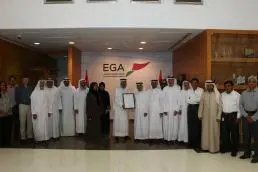PHOTO
Audit of aluminium giant's Information Security Management System yields latest certification
United Arab Emirates: With the information technology wave sweeping the business world and the simultaneous rise of security incidents (as per a recent global survey, 38 per cent more security incidents were detected in 2015 than in 2014), business leaders worldwide agree unanimously on the need for adequate and proportionate security controls. Indeed, the importance for such measures is fundamental to the deep commitment to sustainability and business continuity at Emirates Global Aluminium ("EGA"), where a strong Information security management system ("ISMS") is considered essential for providing secure, reliable and highly available information security system to its employees, customers and business partners.
On the basis of this premise, EGA obtained initial certification to the ISO 27001:2005 ISMS standard in 2006 (in DUBAL) and in 2012 (in EMAL) as a part of its corporate information security compliance programme, which aims to reduce the threat and vulnerability posed to the business continuity by information security risks. Excellent work done in the interim by the Information Technology department has led to the development of an integrated information security system at EGA, which was certified to the more stringent ISO 27001:2013 ISMS standard (an upgraded version of the 2005 edition) on 12 July 2015. Lloyd's Register Quality Assurance ("LRQA", an internationally renowned third-party certification body) issued the certificate to EGA after conducting a comprehensive audit.
Commenting on the achievement, Abdulla Jassem bin Kalban (MD & CEO of EGA) said, "Successfully migrating to the more advanced ISO 27001 standard reflects our corporate commitment to continuous improvement. It also confirms that EGA's Information security practices and controls comply with international standards and best practices, thus ensuring the security of our information assets."
About EGA
Emirates Global Aluminium ("EGA") is a jointly-held, equal-ownership company formed by Mubadala Development Company of Abu Dhabi and the Investment Corporation of Dubai by combining their respective aluminium industry interests. EGA's core operating assets are Dubai Aluminium ("DUBAL", also known as EGA Jebel Ali) and Emirates Aluminium ("EMAL", also known as EGA Al Taweelah), whose combined annual production capacity of 2.4 million tonnes per annum ("tpa") places EGA among the top five primary aluminium producers in the world, by volume. The UAE-based EGA also owns Guinea Alumina Corporation ("GAC"), a strategic bauxite mine and alumina refinery development project in West Africa. In addition, EGA has plans for significant local growth and international expansion.
DUBAL, where commissioning began in 1979, operates one of the world's largest single-site primary aluminium smelters. The DUBAL complex, built on a 4.75 square kilometre site in Jebel Ali, Dubai, comprises a 1 million tpa smelter, a 2,350 MW power station, a large carbon plant, extensive casting operations (more than 1.2 million tpa), a water desalination plant, dock and other facilities. DUBAL holds ISO 9001, ISO 14001, ISO/TS 16949, ISO/IEC 20000-1, ISO/IEC 27001, ISO 22301, ISO 29990, ISO 50001 and OHSAS 18001 certification.
EMAL, where commissioning began at the end of 2009, is the world's largest single-site primary aluminium smelter. The EMAL complex, housed on a 6 square kilometre site in Al Taweelah, Abu Dhabi, comprises a 1.3 million tpa smelter, a 3,100 MW power station, a large carbon plant, extensive casting operations (more than 1.8 million tpa), a water desalination plant, dock and other facilities. EMAL holds ISO 9001, ISO 10002, ISO./IEC 27001, ISO 29990, ISO14001 and ISO/TS16949 certification; as well as OHSAS 18001 certification and NEBOSH certification in Occupational Health and Safety.
The combined DUBAL-EMAL portfolio comprises high quality primary aluminium products in three main categories: high purity and foundry re-melt products (for electronics and aerospace and automotive applications respectively); rolled products (for packaging, lithographic sheets and the automotive industry); and billets for extrusion and forging (for construction, industrial, transportation and automotive purposes). Busbars and anode bars are also made for the electrolytic process used to produce primary aluminium from alumina ore. Over 350 customers are served in at least 68 countries, predominantly in Asia, Europe, the MENA region and the Americas.
© Press Release 2015




















